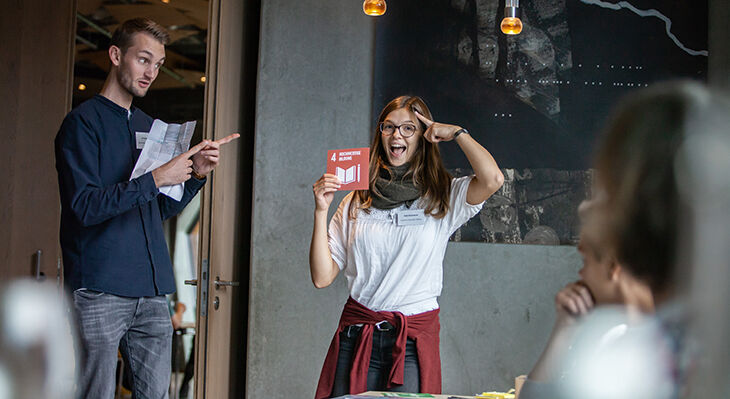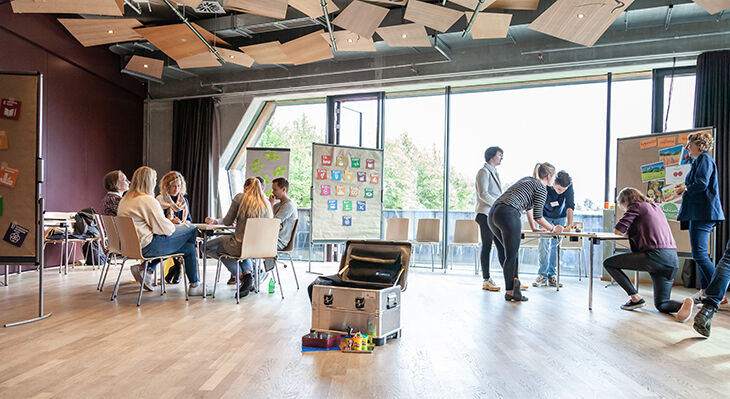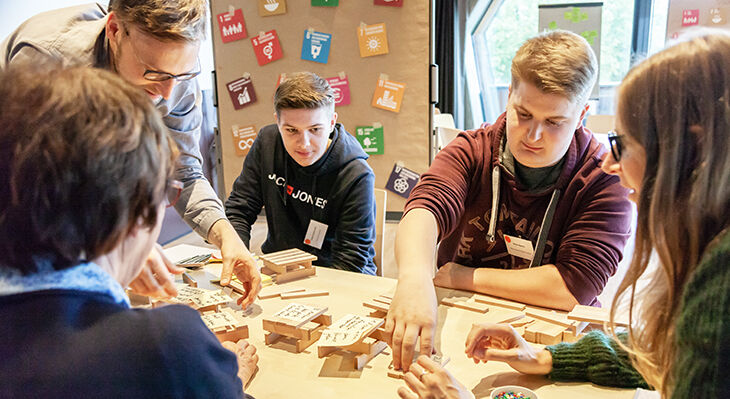Open educational resources for more sustainability in transport and logistics
The module handbook of Pro-DEENLA is an example of how open educational resources (OER) can work in VET. It is aimed at trainees and trainers in freight forwarding and logistics. We talked to Harald Hantke from the University of Lüneburg about why the Pro-DEENLA tasks have international relevance.

Sustainability is a megatrend that is bringing big changes across different industries. This is no small challenge for companies in the transport and logistics industry, a sector where speed is everything. Sustainability here often seems to run counter to efficient processes. To act in a sustainable, socially responsible and environmentally friendly way is an important task in everyday work and vocational education and training can lay the basis for this.
How can businesses be supported when it comes to raising awareness of sustainability among trainers and trainees? This was where Pro-DEENLA came in. Pro-DEENLA was a pilot project concentrating on vocational training for sustainable development (the focus area for pilot projects in 2015-19). BIBB supported the project with funding from the Federal Ministry of Education and Research (BMBF). Together with 15 partner companies, the Leuphana University of Lüneburg collaborated with the Steinbeis Innovation Center Logistics and Sustainability in Sinsheim to develop 27 learning tasks with a focus on sustainability. These aimed to encourage businesses to act with greater environmental and social awareness. They cover a broad range of topics stretching from future-oriented supply chains through combined transport, energy saving, reflecting on resources and managing business digitally and sustainably. Harald Hantke from the Leuphana University of Lüneburg told GOVET more about the pilot project and why the Pro-DEENLA modules also have international relevance.
More about Pro-DEENLA
The Pro-DEENLA learning tasks have been put together in a handbook and can be used for in-company training of freight forwarding and logistics services clerks. These staff perform one of the 326 vocational occupations officially recognised in Germany’s dual training system. The learning tasks also include two modules in English. Further Pro-DEENLA learning modules are currently being translated into English. All the Pro-DEENLA modules can be found on the BIBB website.
What role does sustainability play in training for the transport and logistics industry, and why is it important to integrate sustainability into training of freight forwarding and logistics services clerks?
In our everyday work, we often face a contradiction between efficiency and sustainability, and the transport and logistics industry is a sector where speed is a particularly high priority. Until now, the sector therefore paid little attention to sustainable development. However, working more sustainably is feasible, and it is important to lay the basis for “green skills” right from when people start their training. This was the starting point for our project. Trainees learn to identify these contradictions in everyday work and approach them in a solution-oriented manner.
What does Pro-DEENLA stand for?
Pro-DEENLA is a German acronym that stands for the proactive qualification of vocational staff and a dynamically oriented development, testing and dissemination of sustainability-focused learning tasks in the dual training system. At the heart of the project was the question of how to give trainers and trainees in the transport and logistics industry the necessary skills to incorporate the environmental and social impacts of their activities into work routines that have typically been dominated by economic aspects.
Pro-DEENLA aimed to design, test and disseminate sustainability-focused learning tasks for in-company training as a freight forwarding and logistics services clerk. This process gave vocational training personnel and trainees at 15 partner companies the skills they need for sustainable action in their chosen vocation.
You and your partners developed a handbook designed to teach trainees about sustainability. How does your concept work and how is learning integrated into trainees’ everyday work?
In the first part of the individual learning modules, we provide the vocational training staff with didactic tips on how to apply the learning tasks in practice in the workplace. This enables them to train and develop skills in sustainable management and business practices within their own company. The second part of the learning modules comprises individual learning tasks that trainees can engage with independently of their trainers. We based our handbook on the latest thinking about working sustainably in the transport and logistics sector as well as the vocational training regulations for freight forwarding and logistics services clerks. The tasks are designed so that they can be worked on largely individually or in groups. We believe in self-determined learning and teamwork.
Why is it important to get the training staff on board and provide instructors with specific training on how to deal with sustainability issues?
Good vocational training relies on skilled and dedicated staff. Vocational Education incorporates technical, economic, social and pedagogical disciplines. It prepares staff for the subject-oriented side of teaching and also enables them to engage systematically with the practical training components. As teachers and trainers are both experts and educators at the same time, they can enable trainees to handle complex situations at work. Sustainability-oriented working basically means dealing with competing decision making on how to act. In practice, there are often situations in which we have to decide between two equally valid but opposing alternatives that are both desirable but cannot be realised at the same time. One of the aims of our handbook is to give training personnel the skills to assist and support trainees engaging with these issues.
Open educational resources are booming. You, too, are making your modules freely available online. What have been your experiences and why was this important to you?
It was an important aim of our project that things produced with public money should later be accessible for use without any barriers. Moreover, Pro-DEENLA’s transfer strategy means that OER learning modules consist of two parts (a version for trainers and a version for trainees) and are designed so that they can be used in companies with or without the assistance of Pro-DEENLA. All Pro-DEENLA learning tasks are therefore suitable for use as a permanent part of vocational training practice in the partner companies as well as in other businesses in the transport and logistics industry. We deliberately distributed our handbook throughout Germany via associations and specialist magazines as well as training platforms.
Your handbook also includes modules in English that can be used internationally. Why did you develop these modules in English?
Sustainability is a global challenge and is becoming an increasingly significant part of vocational training on an international level, too. More and more countries want to make sustainable ways of thinking and working part of their vocational education and training. Demand for “green skills” is growing.
Our introductory module “Sustainable Development” is already available in English. This means that the results of Pro-DEENLA can also be used internationally in vocational education and training cooperation. And they have already been: On one hand they featured in a BILT workshop on sustainability in vocational education and training in October 2019, at which nine institutions from eight European countries presented innovative practices and initiatives. On the other hand we also presented Pro-DEENLA at this year’s UNESCO-UNEVOC Virtual Conference on New Qualifications and Competencies in TVET.
More about BILT
The BILT project supports collaboration activities across and beyond the European UNEVOC network. Its goal is to enhance national as well as multinational TVET capacities, generate new knowledge and share information in TVET. In a 'Bridging' component, it acts as a springboard for trans-regional action, involving innovative UNEVOC Centres in the Asia-Pacific and African regions.
Read more about the BILT project on the BIBB website



